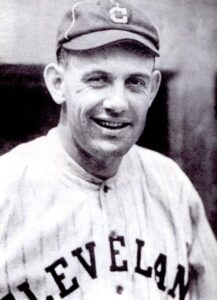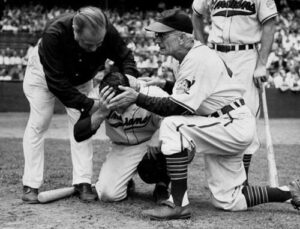
Ray Chapman
Raymond Johnson Chapman played shortstop in the major leagues for nine seasons. His legacy, sadly, is not one that Ray himself would have wished on anyone.
DIRTY BASEBALLS
Ray Chapman, born in Kentucky in 1891, was raised in Illinois. He realized the dream of so many American boys in 1912 when he became the shortstop for the Cleveland Indians.
The speedy Ray had a decent career. He led his team in stolen bases four times, and he batted over .300 on three occasions. An excellent bunter, he holds the single season record of 67 sacrifice hits in 1917. His 52 stolen bases that same year held up as the team record for over six decades.
Rules for pitchers were quite loose during that era in baseball. Spitballs were common, as were balls doctored with soil, tobacco juice, even licorice. Earth-colored balls tended to travel through the air erratically and were hard to see, especially later in the afternoon (no night games back then).
On August 16th, 1920, in a game at the Polo Grounds against the New York Yankees, Ray Chapman was struck in the head by a pitch thrown by submariner Carl Mays. Ray did not react to the pitch at all; eyewitnesses said that he likely did not even see the ball. The contact was so hard that the ball rolled out into fair territory. Mays, thinking it had hit the bat, fielded it and threw to first base. He need not have bothered.
Ray, barely conscious, was helped off the field by teammates, insisting he was all right. He then collapsed and was rushed to a hospital near the Polo Grounds.
Hours later, Ray Chapman died from brain damage. He was 29 years old.

Ray Chapman, barely conscious immediately after the beaning.
Ray is still the only player to die directly from an injury sustained during a major league game. The Cleveland Indians won the 1920 World Series and dedicated the victory to him.
THE IRONY
Many believed that Ray Chapman was going to hang up his glove and spikes after the 1920 campaign. Prior to the season he had married his wife, Katie, daughter of a prominent Cleveland businessman. They would start a family, and he would devote his efforts to her father’s business.
After Ray’s death, MLB established a rule requiring umpires to toss dirty balls out of the game. Spitballs were also banned, though pitchers found their way around that rule for years to come.
Finally, Ray Chapman’s death was cited as a reason for players to wear batting helmets. This common-sense rule went into effect…over thirty years later.
